How to be eligible for Self-determination?
Share On:
A child / adult needs to be a Regional Center's consumer to sign-in for Self -Determination
How to become a Regional Center's Consumer and be eligible for services?
ASSOCIATION OF REGIONAL CENTER AGENCIES CLINICAL RECOMMENDATIONS FOR DEFINING “SUBSTANTIAL DISABILITY” FOR THE CALIFORNIA REGIONAL CENTERS - Code Section 4512, and California Code of Regulations Title 17, Sections 54000 and 54001.
If you believe that a child/adult needs services, base on what you read, ![]() Regional Center Eligibility & Services
Regional Center Eligibility & Services
“Child Find”: The Lore v. The Law
The Child /Adult is Officially in Self-determination !
Our Mission Statement
Our goal is to train you, the consumer or parents/guardians, to become independent facilitators of your own program. The main idea is for you to learn how to find the right services, track progress, its effectiveness, make necessary changes, and control your own program and budget. Therefore, we will develoep those skills and putting that power in your hands, so you can decide and eventually divert the independent facilitator's funds through more needed services and support programs for the consumer.
What is Self-determination?

Self-determination is broadly defined as having abilities and opportunities to steer one’s life in a direction that contributes to a personally satisfying life. Equipping individuals with the skills, attitudes, and opportunities to play an active and prominent role in their community and planning for their future is now considered a best practice in the field of special education.
Over the last several decades a new way of planning services for people with disabilities has been developed. It’s called Person-centered Planning (PCP). It is a discovery process that helps find the balance between what is important TO the individual and what is important FOR the individual.
Self-determination refers to the right of a client to make their own decisions and choices.
Self-determination is defined as the personal decision to do something or think a certain way. An example of self-determination is making the decision to run a marathon without asking anyone's opinion. The right of a people to decide upon their own political preference or form of organizing a room, select his/her clothes, without outside influence.
Why Select SOS Ayuda Legal as your Independent Facilitator?

SOS Ayuda Legal is a team of highly trained professionals certified as PCP and Independent Facilitators in California. We are Spanish natives, with over 40 years of experience in the field of special education, child development, applied behavior analysis (ABA), IEP process and educational advocacy, paralegal, mediation, program organization, and management.
We have been training, effectively hundreds of families with children with disabilities to understand the law and the step-by-step special education process, and its institutions. In addition, we have been one of the initial self-determination professionals who, successfully worked under the Department of Developmental Services (DDS) pilot families' program.
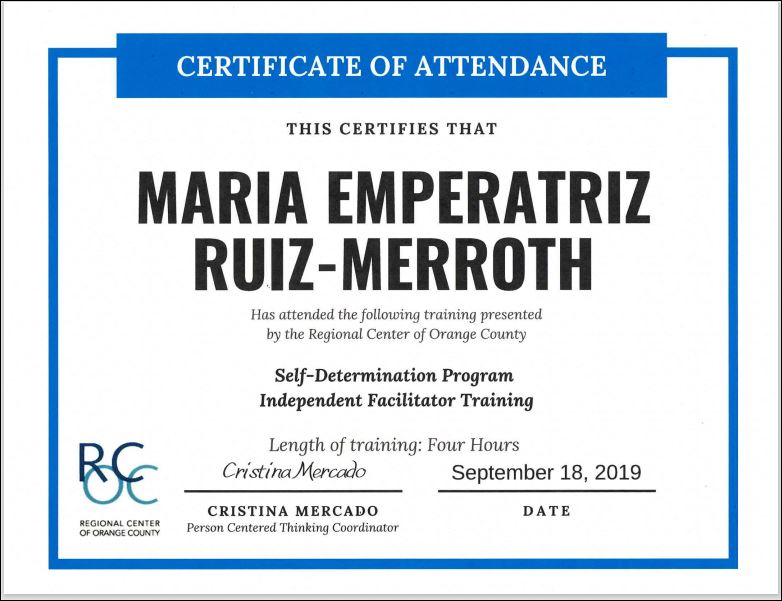
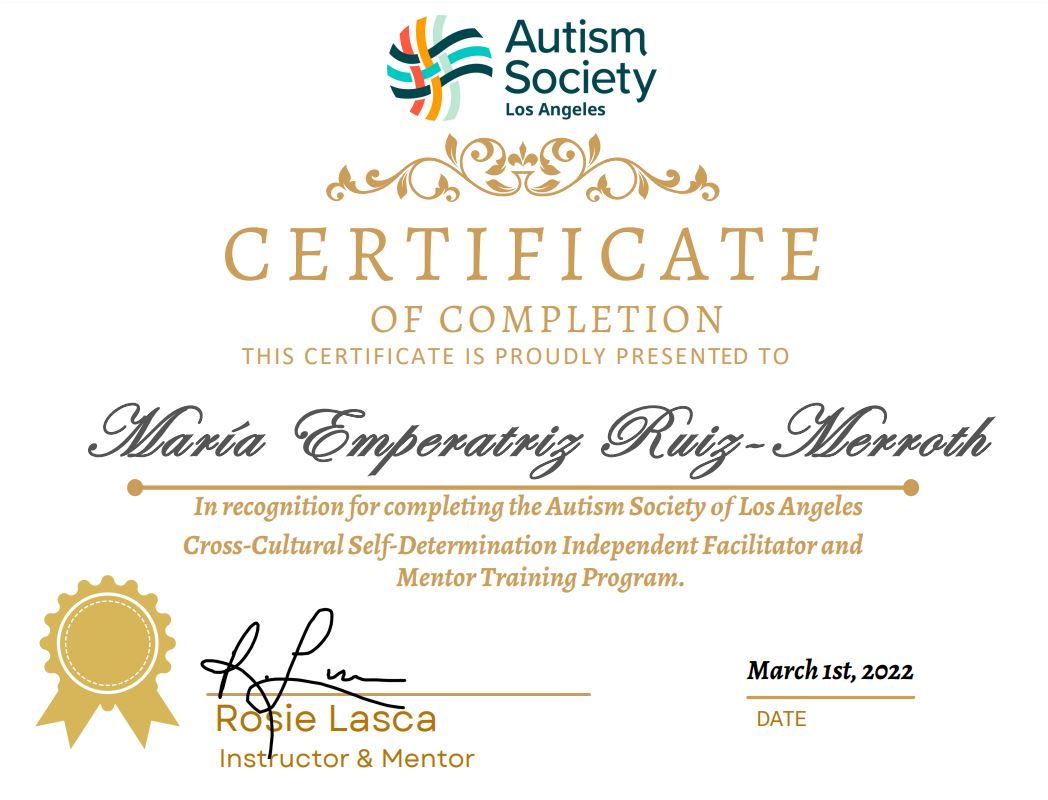
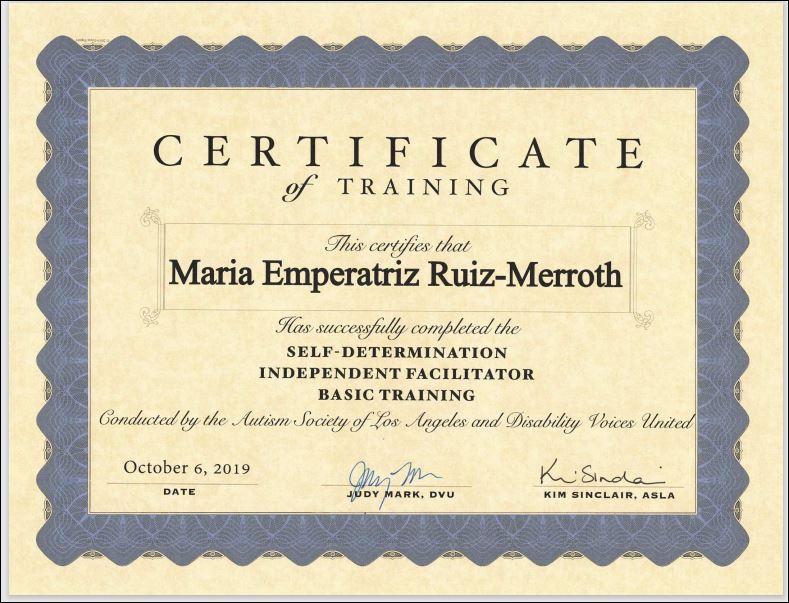
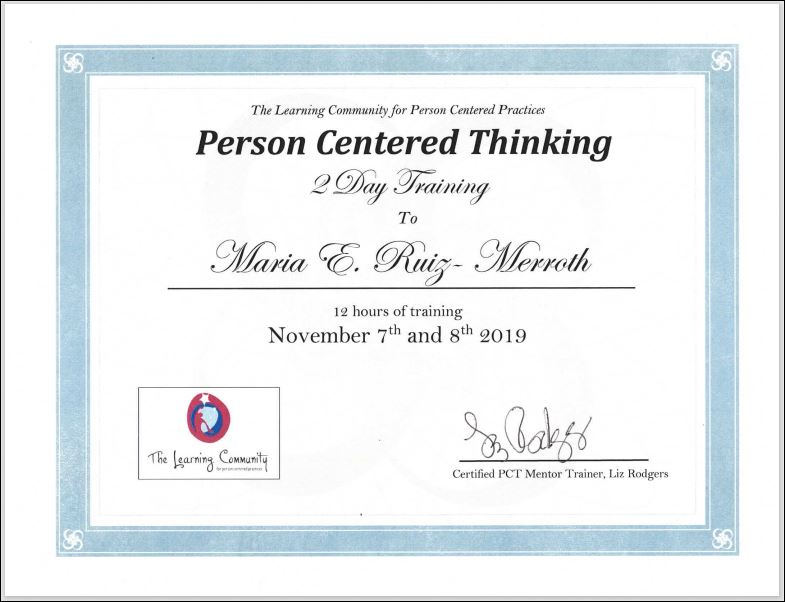
Our Professional Fees
Independent Facilitator Services
$57/ Hour
- Mínimum 10 hours a Month
Note: A written contract and the HIPAA Compliance agreement need to be signed by both parties, before providing any services, as it is required by the State of California.
We Serve the following Regional Centers:

We are vendors of the following Regional Centers:
FMS Providers List Per Regional Center
Service Providers List Per Regional Center
To inform policy and enhance oversight, the Department of Developmental Services (DDS) collects data from many different parts of the service delivery system, including individuals and families. In this section of the website, you can find Regional Center a list of the service providers for each regional center. UPDATED Dec 22, 2023.
The DDS's Flowchart for Self-Determination Program
The DDS' Flowchart in Your Language
Click to view the DDS's Self-Determination Program Flowchart in your language: Spanish, Arabic, Hmong, Japanese, Korean, Laotian, Russian, Simplified Chinese, Traditional Chinese, Tagalog, or Vietnamese.
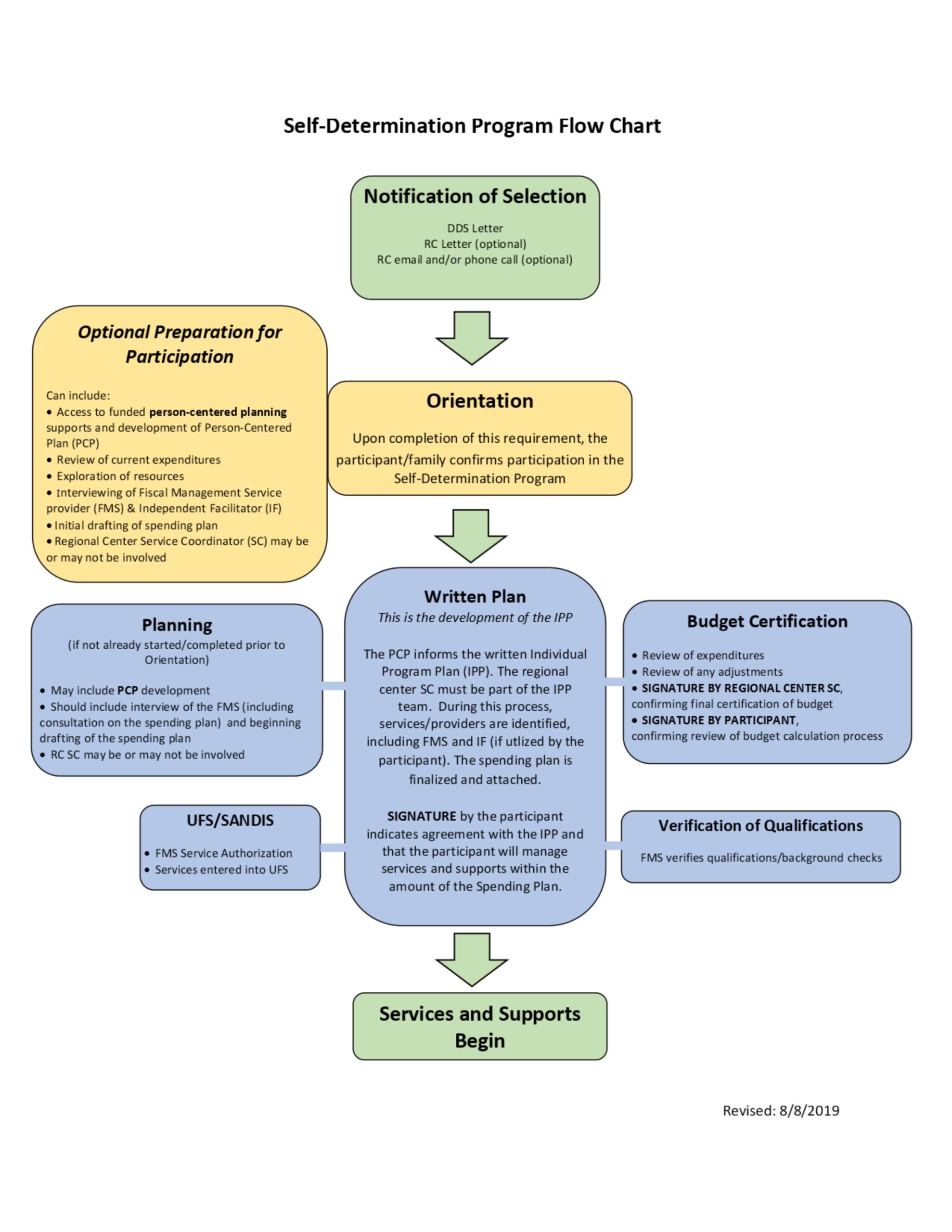
The California State Council on Developmental Disabilities

Vision
Californians with developmental disabilities are guaranteed the same full and equal opportunities for life, liberty, and the pursuit of happiness as all Americans.
Mission
The Council advocates promote and implement policies and practices that achieve self-determination, independence, productivity, and inclusion in all aspects of community life for Californians with developmental disabilities and their families.
What is the State Council on Developmental Disabilities?
The State Council on Developmental Disabilities (SCDD) is established by federal law (Developmental Disabilities and Bill of Rights Act) and state law (Lanterman Act at Welfare and Institutions Code, section 4520 et. seq.). SCDD is to ensure that individuals with developmental disabilities and their families participate in the planning, design, and receipt of the services and supports they need which promote increased independence, productivity, inclusion, and self-determination. Federal law requires SCDD to identify methods to improve and increase services for individuals and their families and to submit these to the federal government in the form of a State Plan. The State Plan is approved by the federal Administration on Intellectual and Developmental Disabilities (AIDD). AIDD is the funding source for SCDD and its State Plan Activities. SCDD and its regional offices’ primary work is achieving the State Plan goals, objectives, and strategies.
California State Council on Developmental Disabilities Representatives - Southern
Orange County Regional Office
CONTACT US
Main Office
2000 E. Fourth Street, Suite 115
Santa Ana, CA 92705
(714) 558-4404
Fax: (714) 558-4704
orangecounty@scdd.ca.gov
SCDD Los Angeles Office
CONTACT US
Main Office
411 N. Central Avenue, Suite 620
Glendale, CA 91203
(818) 543-4631
Fax: (818) 543-4635
losangeles@scdd.ca.gov
San Diego Imperial Regional Office
CONTACT US
Main Office
8880 Rio San Diego Drive, Suite 1015
San Diego, CA 92108-1634
(619) 688-3323
Fax: (619) 688-3296
Email: sandiego@scdd.ca.gov
San Bernardino Regional Office
CONTACT US
685 East Carnegie Drive, Suite 125
San Bernardino, CA 92408
Phone: (909) 890-1259
Fax: (909) 890-1635
Email: sanbernardino@scdd.ca.gov
Personal-Centered Plan

Person-Centered Plan ( PCP)
According to the Administration for Community Living (ACL), "person-centered planning (PCP) is a process for selecting and organizing the services and supports that an older adult or person with a disability may need to live in the community. Most important, it is a process that is directed by the person who receives the support."
ACL stated as well that "PCP helps the person construct and articulate a vision for the future, consider various paths, engage in decision-making and problem solving, monitor progress, and make needed adjustments in a timely manner. It highlights individual responsibility, including taking appropriate risks (for example, whether arranging for backup staff is needed). Emergency planning is often part of the process."
As noted by the ACL, "the PCP approach identifies the person’s strengths, goals, medical needs, needs for home- and community-based services, and desired outcomes. The approach also identifies the person’s preferences in areas such as recreation, transportation, friendships, therapies and treatments, housing, vocational training and employment, family relationships, and social activities. Unique factors such as culture and language also are addressed." (Reference: ACL Person-Centered Planning) The PCP builds and describes the person’s vision for their future. These elements should and need to be included in a written plan for supporting the person, which is developed based on those considerations.
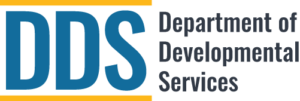
Regional Center Directives - Read before continuing. Very important
It is very important that consumers and families are aware that on a regular basis DDS is updating REGIONAL CENTER DIRECTIVES, in regard to Self Determination in California.
Please, before you agree and sign a PCP budget or Spending Plan, review the following information. Some Regional Centers and Independent Facilitators are not aware of these DDS updates about Self Determination. For more information CLICK HERE
How to Select the Right Professional to Develop A Succesful Personal-Centered Plan?
It is your Future - Select Right
Self-Determination starts with person-centered planning. The importance of selecting a PCP professional who knows the RC system, the self-determination process, and the importance of creating a complete, detailed, and personal centered PC plan is crucial. The initial PCP will serve as the basis of future one. as it is a process of learning how a person wants to live, preferences, choices, and abilities while involving family, friends, and professionals as personal desire or requires.
The most important part of selecting the right PC Plan professional, if the capacity to listen, work as a team, respect the consumer's desires and goals, and work together in helping the consumer to address these needs, preferences, and desires.

Charateristics of All Person-Centered Plan Professional
- Person-Directed–The plan for the individual is the person’s vision of what he or she would like to do. The plan is not static but rather it changes as new opportunities and obstacles arise.
- Capacity Building–Planning focuses on the person’s gifts, talents, and skills rather than on deficits. It builds upon the individual’s capacities and affords opportunities that will reasonably encourage individuals to engage in activities that promote a sense of belonging to the community.
- Person-Centered–The focus is continually on the person for whom the plan is being developed and not on plugging the person into available slots in a program. The individual’s choices and preferences must be honored.
- Network Building–This is the process of bringing people together who care about the person and are committed to helping the person articulate their vision of a desirable future. They learn together and invent new courses of action to make the vision a reality.
- Outcome-Based–The plan focuses on increasing any or all of the following experiences which are based on the individual:
-
- Growing in relationships or having friends.
- Contributing or performing functional/meaningful activities.
- Sharing ordinary places or being part of their own community.
- Gaining respect or having a valued role that expresses their gifts and talents.
- Making choices that are meaningful and express individual identity.
6. Community Accountability – The plan will ensure adequate support when there are issues of health and safety while respecting their dignity as fully participating members of the community.
7. Strong mediation skills and the capacity to determine when the self-determination of a client is at risk.
The Disability Voice United offers key information about finding the right Self-Determination provider for you, and what questions to ask. Click for more information about Finding the Right Providers
The Individual Budget & Spending Plan
The Individual Budget
The individual budget is the amount of funding available to you to purchase the services and supports you need to implement your IPP. For current regional center consumers, the budget will equal the total expenditures (not authorized services) made by the regional center on your services during the past 12 months.
Your Individual Budget will not be increased to include the costs for the independent facilitator or the financial management service.
According to The Self-Determination Interchange, "For current regional center consumers, the budget for Self-Determination Program participants will equal the amount the regional center spent on your services during the past 12 months.
For a participant who is new to the regional center system or does not have 12 months of previous expenditures, the IPP team will determine the services and supports needed and available resources based on the average cost paid by the regional center for a similar person unless the regional center determines that you have unique needs that require a higher or lower cost. "

Spending Plan
The Spending Plan, which identifies the type and amount of all the needed services and supports to achieve your goals and ensure your health and safety. The spending plan must identify the cost of each service, activity, or item that will be purchased with your SDP budget. This includes the cost of the FMS, which is a required service for all SDP participants, and the independent facilitator. In addition to wages, costs for employee benefits, payroll taxes, and insurance must be included when determining the cost of each service. The total spending plan amount cannot exceed the individual budget amount. The spending plan will get attached to the IPP.
For more information on the development of the individual budget, spending plan, and how it can be changed, you can look at the following:
Financial Management Service ( FMS )
FINANCIAL MANAGEMENT SERVICES (FMS)
1. What are Financial Management Services?
Financial Management Services (FMS) helps participants manage their individual budgets by paying bills and managing the payroll for support workers.
2. Does everyone have to have an FMS provider?
Yes. The participant is required to utilize the services of an FMS provider of his or her
choosing. The FMS provider must be a vendor of a regional center to provide any services to consumers.
3. Who pays for the cost of my FMS provider?
The cost of the FMS provider will be paid by the participant out of his or her individual budget. The SDP offers additional flexibility and options regarding who provides services and supports, including non-vendor providers. As a result, the amount the participant pays for a service could be less under the SDP.
4. In the co-employer model, is it possible for the person receiving services and their family to be part of the interview process and/or develop the interview questions?
Yes. The participant and any person selected and directed by the participant can be as
involved as they choose to be with.
5. Who can be a Financial Management Services Provider?
Any entity or person, except a relative or legal guardian, chosen by the participant and meets the qualifications may be a Financial Management Services provider.
6. As a Self-Determination Program participant, would I pay my providers directly and get reimbursed by the Financial Management Services entity, or would I submit the expenses to the Financial Management Services entity for payment to my providers?
Neither. The Financial Management Services Provider will pay providers directly.
7. For individuals needing 24-hour supportive services, is overtime pay applicable
whether the co-employment model or fiscal employer agent is selected?
Each participant will need to work with their Financial Management Services Provider to determine when overtime pay is appropriate and/or required.
DDS Financial Management Service (FMS) Contact List
Contact Us
PHONE:
(949) 326- 6612
Hablamos Español
EMAIL:
sos5ayudalegal@gmail.com
ADDRESS:
600 W Santa Ana Blvd, Suite 206, Santa Ana, CA 92701

Across from The USCIS Federal Building
HOURS:
Monday - Friday: 9 am - 5 pm
Saturday - Pre-Pay Appointment ONLY
Sunday: Closed
Disclaimer:
SOS Ayuda Legal, LLC is not a law firm and is not and will not act as your attorney. We can only provide self-help services under your specific direction. SOS Ayuda Legal, LLC cannot represent you in court in any matter, select legal forms, or give legal advice. Services are provided at your request and are not a substitute for the advice of a lawyer. If you need to consult with an attorney, please contact the California Courts Self-Help Center near you. Legal document preparation is provided to the public under the Business & Professional Code 6400. Registered and bonded by The Orange County Clerk-Recorder LDA #509, and UDA #017.

